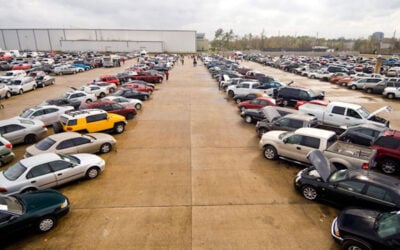Car dealers catch a lot of flack. The annual trustworthiness of professions poll from Gallup ranks car salespeople at the bottom of the list. To suggest that car people aren’t held in high regard would be an understatement. It doesn’t help when car dealerships engage in the practice of title washing and other consumer unfriendly practices. All too often we see a story on the evening news that reminds us of why car dealers are often considered the “scum of the earth.”
Having been in the car business for 43 years, I know that not all car people are bad people. Actually (and this may come as a surprise), most car people I know are good, decent, and humane individuals (far from the characterization they receive at work). However, as with all things in life, a few bad apples can ruin the bunch, and the same holds true for car dealers.
Recently I came across a news story out of Georgia that told the journey of a fateful 2015 Toyota 4-runner that was sold 7 times over the span of 5 years in 5 different states; each time with a clean title. The kicker is, the car didn’t have side airbags in it. How could it possibly have been sold 7 times in 5 different states (each with a clean title) even though the car didn’t have side airbags? The answer: title washing.
What is title washing
Washing a vehicle title is the process of taking a total loss vehicle (when it would cost more than a car is worth to repair it) and physically moving it to another state where the title can be recognized as “clean,” instead of salvaged or branded. When a vehicle sustains severe damage, insurance companies are required to update the status of the vehicle’s title to reflect its condition, however, each state has different requirements for what must be reported, and to whom.
For example, Texas state law allows vehicles that have been in an accident to retain a clean title without proof that critical safety repairs have been fixed. In the case of our 2015 4-runner from Georgia, the side airbags had never been replaced, however the vehicle was sold with a clean Texas title at a Progressive Insurance vehicle auction. It was then transported to Georgia where it was bought and sold multiple times to unsuspecting dealers and buyers.
Title washing is unfortunately all too common in the car business. Since each state has different legal requirements for what information (and how much information) must be reported to the local government we end up with situations where nefarious people can take advantage of loopholes across state borders.
Title washing is a federal crime, however enforcement of this law is few and far between. A quick google search of “title washing crime” returns many results, but it quickly becomes clear that enforcing title washing laws across all 50 states is a task too large for any existing federal government agency. State governments are then tasked with enforcing these laws, however many are lax in their pursuit of title washers.
With one out of 44.6 cars having a washed title, the state of Mississippi has the worst title washing problem in the country. Siloed databases, different definitions of “salvage” or “branded” title, and myriad other reasons explain why Mississippi (and many other states) face major challenges from title washing.
How do you know if a vehicle’s title has been washed
The unfortunate thing about title washing is that frequently many people in the buying process have been fooled by what they thought was a clean title vehicle. For example the story of our 2015 Toyota 4-runner in Georgia was initially sold to a dealer that did not know it had previous accident history and was missing airbags.
The owner of the first dealership that sold the vehicle to a consumer ended up refunding the customer once the customer learned that the vehicle didn’t have side airbags (something their mechanic) was able to uncover.
This simply goes to show that you have to be your own advocate during the car buying process and you can’t assume that anyone is looking out for your best interests. It’s an unfortunate reality, but it’s the truth, and it’s especially true when considering the purchase of a used vehicle.
How can I protect myself
Buying a used car is a bit like gambling. You’re making a bet that the car you are buying is in good mechanical condition and won’t turn into a clunker overnight. How can you increase your odds of making a good bet? It’s easy; get a pre-purchase inspection done before buying any used car.
A pre-purchase inspection is non-negotiable when purchasing a used car. It’s unfortunate that there is no other way to protect yourself from accidentally purchasing a vehicle with a washed title, but the best thing you can do is take proactive steps to minimize the risk.
In addition to an inspection (which we really think is a must if you are purchasing a used vehicle) you can (and should) also refer to the vehicle’s Carfax or AutoCheck report. Bear in mind that Carfax and AutoCheck reports are only as accurate as the information they receive, however they may indicate that a vehicle has had a previous accident, and if it does, that can be an indication to you that the vehicle is not worth purchasing.
Another option that we strongly recommend you consider is contacting your insurance company and asking them if they have any records on the vehicle you are considering. You will need to share with them the VIN, and they should be able to provide you with even more information than the Carfax report.









![10 Cars with the Lowest Cost of Ownership [2026 Data]](https://caredge.com/wp-content/uploads/2026/02/2026-Toyota-Corolla-Hatchback-400x250.png)



Knowledge is power.
After a seven month process of deciding what my next car was going to be, along with watching your videos I bought a 2020 Hyundai Kona ultimate for $5200 under MSRP on the last day of the month.
Thanks! I would never have gotten a deal like that without the knowledge I acquired from you guys.
Are dealerships typically willing to hold a car for a couple days to get the 3rd party inspection done? Would that require a deposit?
I have asked several times with private sellers and they refused because they didn’t want to take it off the market. First with the cash and all that. Love your website. Thanks!